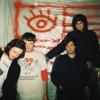Athens Remembers David Bowie

To say David Bowie's influence was vast is to understate the significance his music has had in the personal and creative lives of hundreds of millions of people around the world. In our little corner of the globe, he remains a constant presence. Strains of Bowie's work can be heard throughout the history of Athens music: Pylon's throbbing post-punk; the Olivia Tremor Control's psychedelic soul-searching; the B-52s' cheeky pop; of Montreal's androgynous psychodrama.
Following the legendary musician's death from cancer only days after his 69th birthday and the release of what appears now to be a deliberately scheduled swan song, Blackstar, we asked several Athens musicians how Bowie's work has influenced and inspired them over the years.
Kate Pierson (B-52s): David Bowie had a huge influence on me and the B-52s. His music is powerful, timeless and unique, and his androgynous style was a freedom flag for those of us who followed in his path. He came to one of our shows in 1978 along with Frank Zappa and we were so excited! Cindy shouted out, "Y’all! DAVID BOWIE is here," and he was standing right behind us, so we all had to laugh! I met him a few times, and he always gave me a hug and was so gracious! I think he was a beaming light to Athens bands because he was fearlessly different, and that’s what Athens bands are known for.
Andrew Rieger (Elf Power): David Bowie's "Queen Bitch" was one of the first songs Elf Power learned how to play as a band when we first started playing together in 1994, and we still play it at shows to this day. "Ziggy Stardust" and "Hunky Dory" particularly were hugely influential on our playing and songwriting. Bowie was more complex and complicated than his hippie predecessors and their sometimes simplistic peace-and-love sloganeering, as well as the nihilistic punks that he inspired, whose bleak rhetoric was at times a bit one-dimensional. His lyrical and visual genius was unparalleled, as he was the first mainstream rock artist to really play with gender confusion, blurring sexual boundaries as early as 1972, with songs like "Moonage Daydream" in which he's a "mama-papa coming for you" and a "rock 'n' roll bitch" declaring, "The church of man love is such a holy place to be," a great line that celebrates his androgyny and bisexuality while also cautioning against co-opting these qualities solely for fashion or fun. That's how I always interpreted it, anyway!
Vanessa Briscoe Hay (Pylon): David Bowie was a fascinating artist whom I first discovered while in high school through his first U.S. radio hit. That song, "Space Oddity," appealed to both my sense of otherness and to my love of anything outer space/sci-fi related. After moving to Athens to attend art school—seemingly a million light years away from my rural home—I happened to see the "1980 Floor Show" on the Midnight Special. I became an instant fan. There were a few others in my dorm. That's where I met Dana Downs. As time passed, it was interesting to watch as Bowie moved through so many changes and personas. He helped create acceptance for those who felt different and made that difference cool, along with bands like Roxy Music, the New York Dolls and Patti Smith. Like Bowie, in the 1970s we were going through our own changes here in Athens. A wonderful art and party scene to rival any anywhere sprang up, sparked by the UGA art department kids and the B-52s. On hot, damp, darkened summer lawns cooled by sprinklers and in crowded house parties fueled by keg beer, vinyl like David Bowie's Heroes was being spun on record players. We danced and felt like heroes just for one moment.
Michael Stipe (R.E.M.): Right now, it feels as if the solar system is off its axis, as if one of our main planetary anchors has lost its orbit. That said, I am certain that wherever Bowie is now—I want to be there someday.
Jim White: Growing up in one of the most conservative regions of the USA, you get a skewed perspective on what it means to be a human being. Life is narrow, fearful and unimaginative and breeds fairly intense counterculture reflexes. That's where I was when the existential dreamscape of Bowie's "Space Oddity" hit the North Florida AM radio waves (no FM back then) in 1970. Me and my buddy sat in an older kid's car out on the beach, smoking weed and flipping between stations, looking for something worth a shit to listen to. Gimmick song, schlock psychedelia, Motown knockoff—dreck, for the most part. Then, there it was, like a beacon of light arrowing into a dark dark place in my mind: "Ground control to Major Tom." I was instantly thrust into that heightened aesthetic realm, a place I knew existed but, due to the strictures of our culture and technology back then, had little access to. In the ensuing weeks I discovered that "Space Oddity" was on heavy rotation during the late-night hours over at WBSR. Over the next month or so I'd lay in my bed with my transistor radio pressed to my ear, and every time it came on, I went flying, sprung free from the straightjacket of life in the Deep South in 1970. I heard this Bowie guy was going to do a TV appearance on some show, "The Smothers Brothers" or something, and when I saw what he looked like I recoiled. His weird, androgynous appearance terrified me almost as much as when I saw Donovan sitting criss-cross applesauce on that fur rug singing about something called "Mellow Yellow" on the Ed Sullivan Show. But like Donovan, I couldn't get Bowie's songs out of my head, and so, slowly but surely, I came to accept his bizarre appearance, his stilted, self-conscious theatricality, his tendency to shape shift with trends in music. None of that mattered to me. I kept coming back to him because at the core of what he did bright light was emanating, and eventually I came to understand that that's all that matters in truly inspirational art.
Wrenn: One cannot ignore David Bowie's visual sensibilty and his marriage of fashion to musical performance. Artists like myself, Madonna, Lady Gaga, etc. are clearly products of a pop world influenced by Bowie. He was one of the first artists to continually reinvent his character, to dress however he liked, ignoring gender completely and proving that performers can express themselves in many more ways than just their music. Everything about him was a work of art. This idea that the stage can be an outlet for my music, my fashion, design, performance and visual art all at once I owe to Bowie. May he rest easy.
Lee Guentert (The Orange Constant): In many ways David Bowie was one of the first artists to defy genre completely. [With] every album he released—and there are 25 in total—he challenged himself to create something completely new. His desire to innovate has inspired The Orange Constant to be proud of creating music that is difficult to classify. David Bowie's influence can be heard in all corners of contemporary music, and it is safe to say there will never be another artist like him.
Mike Mills (R.E.M.): I was lucky enough to sit next to David Bowie at dinner at our friend Claude's home in Switzerland in 1999. He was kind, funny, friendly and shared some fascinating and unusual thoughts on the upcoming millennium, and how he had become a devotee of things digital, doing all his writing and art on his computer. I bought a book/box of digital lithos of him, Eno and the Minotaur of legend. To be able to see the lovely and warm person behind all of that amazing body of work was a gift I will never forget. R.I.P., Starman, and thank you.
AJ Griffin (Circulatory System, French Exit): Saying David Bowie has had an influence on Athens musicians is a bit like saying college football has had an influence on Athens' economy, or that the sun influences whether or not it's light outside, or that gravity exists. It's the kind of thing that you really don't need to say at all, and would most likely elicit a blank look of, "Wait, does this asshole think he's being insightful right now?" from its recipient if you did. But what's sort of interesting, I think, is different people's appreciation and interpretation of what "David Bowie" really meant. Because, unlike most artists, Bowie got to play both sides of the ball in a way—he was simultaneously weird but popular, innovative but classic, rich and famous but still artistically driven—and as a result, how someone views his legacy ends up being a reflection of their own personal aesthetic. David Bowie had hit songs and sold records and Danced in the Streets with Mick Jagger; he also released a dark, half-instrumental failed movie soundtrack inspired by the personal wreckage of cocaine addiction, and willingly hung out with Iggy Pop. Which of those statements a person finds most relevant to their understanding of Bowie speaks not to him having a polarizing career output, but rather the natural and eternal dichotomy of how individuals experience art, and the specific values they seek from it. To wit: My mother likes David Bowie. I like David Bowie. But the last time I picked out a Bowie album to listen to in her car, it didn't get past track three. "Definitely not my favorite," she said diplomatically; she's more of an "Ashes to Ashes" fan. The point is not that I am cool and my mom isn't—my mom is cooler than your mom!—but that we're looking for different things. I want music that's challenging, intriguing, dynamic, sometimes experimental, and my mom wants to hear some damn crooning already. These are equally compelling desires, and ones that Bowie kindly obliged throughout his life. You just have to figure out what you want.
Which brings us, finally, to Athens. We're frequently reminded that we live in a special little bubble here, and it's no more evident than in taking a quick stroll through Facebook right now. Spoiler alert: we're the weirdos. Athens collectively celebrates the David Bowie whose keyboards sound like a laser gun in a washing machine, who cross-dressed and did drugs and chilled with Brian Eno, who seemingly played the piano with a hammer at times. If Bowie says "Let's Dance," we gladly do, but at the core of our true affection is that twisted, weird, boundary-pushing side to the man. That's notable when seen across pretty much a whole community. It's certainly not to say that we're wiser or more debonair than the rest; it's just a testament to the spirit for which Athens is known and cherished, and the collective ambition of its residents to seek newness, be different and create weird-ass shit however we can. In a lot of places, David Bowie's death was a reason to play "China Girl" on the local classic rock station and an easy topic for workplace small talk. In Athens we burst forth with tributes and celebrations, everybody sharing the things that had affected them most, planning tribute shows, reminiscing about seminal life moments Bowie's music provided. We shared not the songs that we've heard the most, but the ones that spoke to us the most. That we react this way, I think, says more about ourselves than it does about him.
Jason Fusco (Shehehe): I wanna thank David Bowie for creating side two of Scary Monsters and inspiring me to come up with my wife's favorite nickname for my penis when it floats back and forth in the gentle waves of our bathtub: "David Buoy."
Jason NeSmith (Casper and the Cookies): Growing up in intown Atlanta I was steeped in Bowie. All the girls and lots of the boys around me were inspired to reinvent themselves. I couldn’t count myself among his fashionistas—too short and chubby, though the Cookies did a lowbrow version of glam much later.
What captivates me is his skill at bringing progressive and subversive musical ideas to the mainstream. Dad bought the Station to Station LP when it came out. "Golden Years" was super catchy and weird. I loved it, and that allowed me to explore the rest of the album, which has lots of even crazier ideas.
Forty years later he was still blazing trails, way ahead of everyone even while he was dying. The day his last album was released I took my earbuds to bed. Closing my eyes, I gave Blackstar my complete attention. By the time it finished I was wide awake, eyes still closed, almost subconsciously rewriting my newer songs to incorporate the lessons I had just received.
David Barbe: When I say "Bowie" I don't just mean David Bowie, but his work, which always seemed to me to be an extension of the man himself. I love that I can jump into his work at any chronological point and find it interesting, unique, intelligent. By never standing still in one place too long he was able to constantly move forwards, even as he reached an age where most artists are simply regurgitating their greatest hits. He was one of a kind, and a true inspiration.












comments